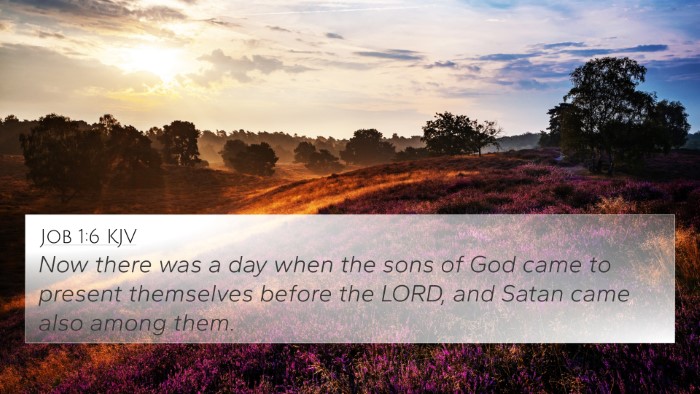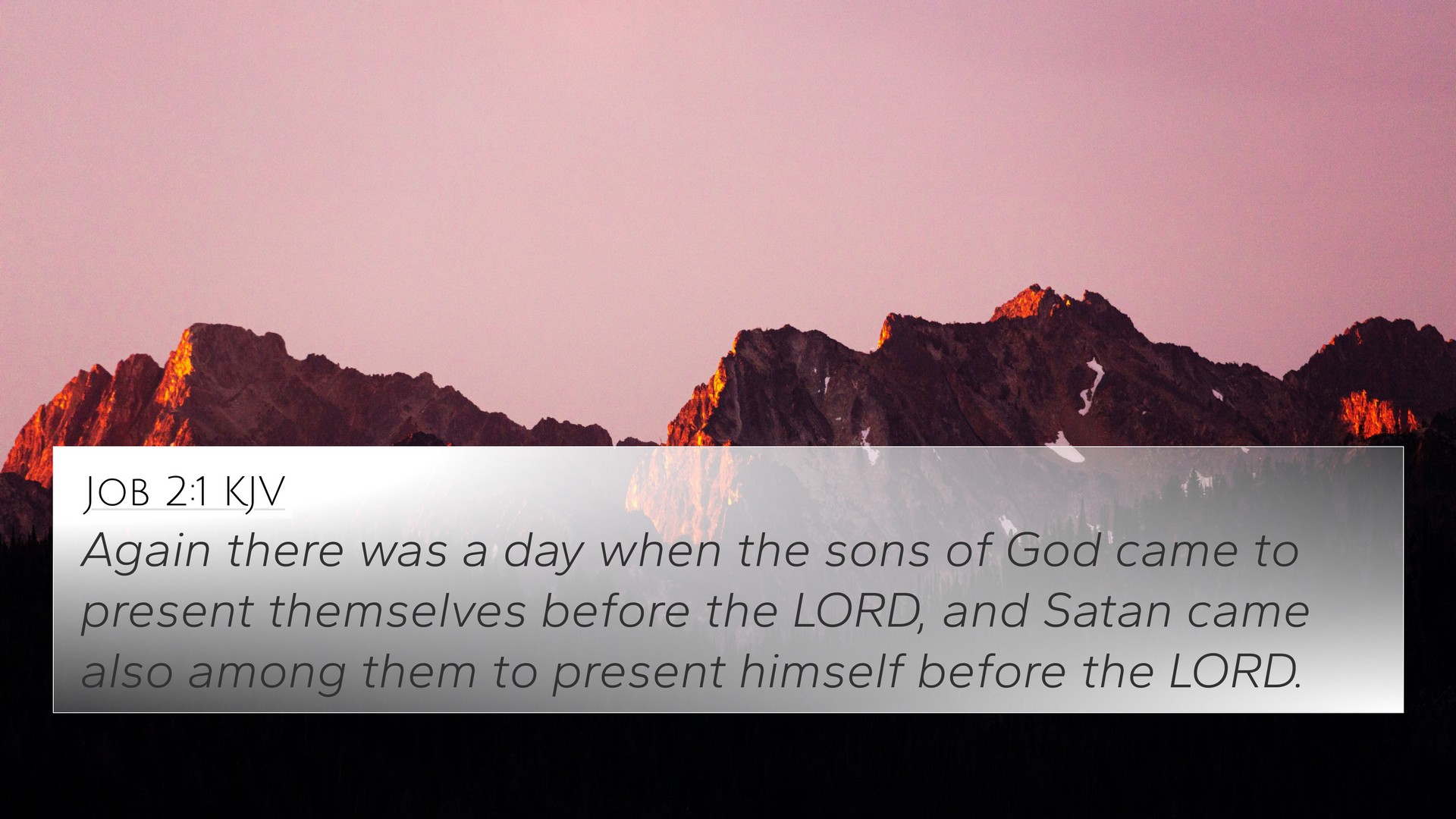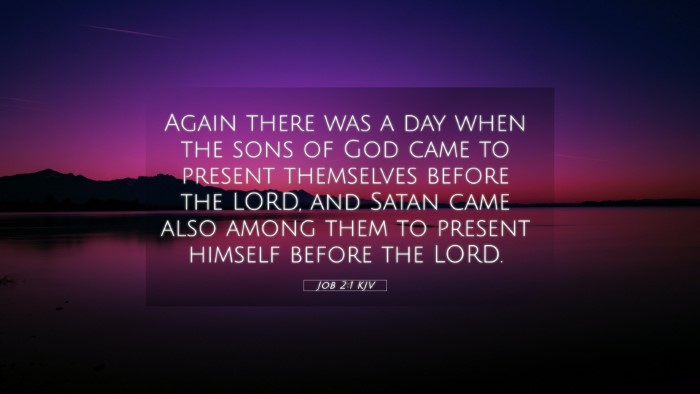Old Testament
Genesis Exodus Leviticus Numbers Deuteronomy Joshua Judges Ruth 1 Samuel 2 Samuel 1 Kings 2 Kings 1 Chronicles 2 Chronicles Ezra Nehemiah Esther Job Psalms Proverbs Ecclesiastes Song of Solomon Isaiah Jeremiah Lamentations Ezekiel Daniel Hosea Joel Amos Obadiah Jonah Micah Nahum Habakkuk Zephaniah Haggai Zechariah MalachiJob 2:1 Similar Verses
Job 2:1 Cross References
Again there was a day when the sons of God came to present themselves before the LORD, and Satan came also among them to present himself before the LORD.
Uncover the Rich Themes and Topics of This Bible Verse
Listed below are the Bible themes associated with Job 2:1. We invite you to explore each theme to gain deeper insights into the Scriptures.
Job 2:1 Cross Reference Verses
This section features a detailed cross-reference designed to enrich your understanding of the Scriptures. Below, you will find carefully selected verses that echo the themes and teachings related to Job 2:1 KJV. Click on any image to explore detailed analyses of related Bible verses and uncover deeper theological insights.

Job 1:6 (KJV) »
Now there was a day when the sons of God came to present themselves before the LORD, and Satan came also among them.

Luke 1:19 (KJV) »
And the angel answering said unto him, I am Gabriel, that stand in the presence of God; and am sent to speak unto thee, and to shew thee these glad tidings.

Hebrews 1:14 (KJV) »
Are they not all ministering spirits, sent forth to minister for them who shall be heirs of salvation?

Isaiah 6:1 (KJV) »
In the year that king Uzziah died I saw also the LORD sitting upon a throne, high and lifted up, and his train filled the temple.
Job 2:1 Verse Analysis and Similar Verses
Meaning and Interpretation of Job 2:1
Job 2:1 presents a pivotal moment in the narrative of Job, where a heavenly council convenes before God, reminiscent of the earlier scenes in the first chapter. The verse reads: "Again there was a day when the sons of God came to present themselves before the Lord, and Satan came also among them to present himself before the Lord." This verse serves as an introduction to the second round of testing that Job will face, setting the stage for further exploration of human suffering and divine sovereignty.
Summary of the Verse
In this verse, we observe a repeat of the divine assembly where the "sons of God" (angels) gather in the presence of the Lord, with Satan among them. It emphasizes the ongoing dialogue between God and Satan regarding Job's faithfulness. The presence of Satan signifies the adversarial role he plays, challenging the integrity of God's faithful servants.
Commentary Insights
To understand the elaborate implications of this verse, we can refer to insights drawn from renowned public domain commentaries:
-
Matthew Henry:
Henry notes that the phrase "sons of God" signifies the heavenly beings who serve God, coming to report on their activities. The presence of Satan indicates that he is not entirely absent from heavenly proceedings. This establishes a continuous narrative of conflict between God’s purposes and the challenges presented by Satan, focusing on the theme of suffering in the pursuit of faith.
-
Albert Barnes:
Barnes emphasizes the significance of the heavenly council and highlights the idea that Satan is acknowledged before God. He interprets this as a reflection of God's sovereignty, asserting that Satan operates within the boundaries set by God. The divine deliberation serves to indicate both the seriousness of Job's trials and the overarching divine governance of the universe.
-
Adam Clarke:
Clarke adds further nuances, explaining that the gathering shows the accountability of celestial beings before God. He interprets the involvement of Satan as a reminder of the constant spiritual warfare in which believers are engaged. The accusation against Job indicates a broader theme of testing faith amidst hardship.
Theological Themes
This verse encapsulates several important theological themes, including:
- The Nature of Divine Sovereignty: Shows God’s ultimate authority in permitting or restricting Satan’s actions.
- The Role of Suffering: Job’s trials serve to illustrate a deeper question about the nature of righteousness and divine justice.
- Spiritual Warfare: The interaction between God and Satan hints at the ongoing battles faced by believers in their faith journeys.
Cross-References
Job 2:1 has well-established connections with various other scriptures that enhance its interpretation. Below are 7-10 related verses that provide further context and themes:
- Job 1:6-12: The initial meeting where Satan challenges Job’s integrity.
- Zechariah 3:1-2: A similar scene where Satan stands as an accuser before God.
- Luke 22:31-32: Jesus speaks of Satan seeking to sift Peter like wheat, showcasing spiritual trials.
- James 1:12: Highlights the blessing of persevering through trials and temptations.
- 1 Peter 5:8: Encourages vigilance against the adversary who seeks to devour believers.
- Romans 8:38-39: Reassures believers that nothing can separate them from God's love, even amidst trials.
- Revelation 12:10: Describes Satan as the accuser of the brethren, emphasizing his role in spiritual accusations.
Exploring Additional Connections
This verse encourages deeper exploration through cross-referencing biblical texts. Here are some tools and methods that can aid in your study:
- Utilizing a bible concordance to find words and themes related to suffering and faith.
- Engaging in cross-reference Bible studies to draw connections between different scriptural passages.
- Employing comprehensive Bible cross-reference materials for an in-depth analysis.
Conclusion
In summary, Job 2:1 invites readers to explore the nature of God's relationship with humanity amid trials, offering profound interpretations through the lens of faith and suffering. This verse serves as a crucial link in understanding the broader narrative of Job’s experience, while also highlighting key theological principles that resonate throughout the scripture.


